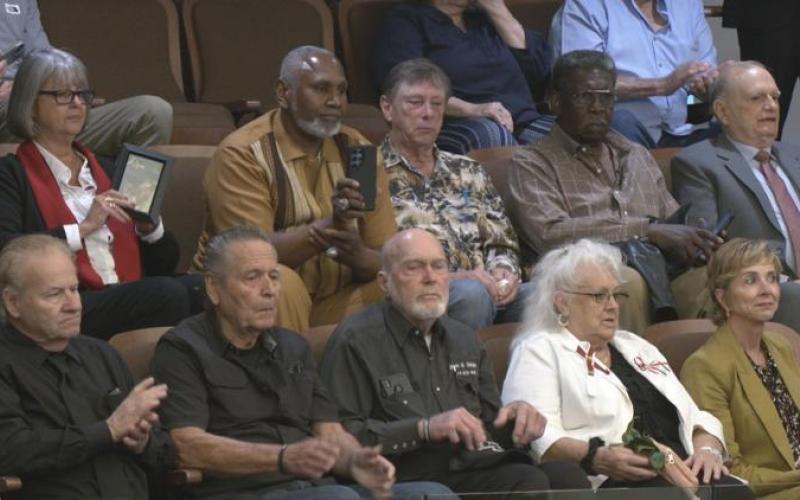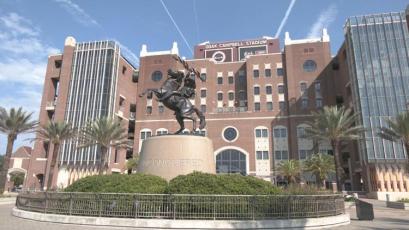News Service of Florida
Wiping away tears, men in their 60s, 70s and 80s watched Monday as the Florida Senate unanimously gave final approval to a plan to steer $20 million to survivors of abuse at the notorious Arthur G. Dozier School for Boys in Marianna and another state reform school.
Roy Conerly, who turned 78 on Monday, is among the men known as the “White House Boys” who’ve been traveling to Tallahassee for more than a decade seeking compensation after being raped, beaten and tortured as children in the care of the state at the now-shuttered Dozier school.
“I’ve been looking for this for 15 years,” Conerly, wearing a black shirt embroidered with the “White House Boys” logo on the back, told The News Service of Florida, choking back tears. “Every year I was hoping it would happen on my birthday. I get messed up every time I come. It’s not just because it’s my birthday. Every time I come up here I start sniveling.”
The measure (HB 21), approved by the House last week and now headed to Gov. Ron DeSantis,
would create “The Dozier School for Boys and Okeechobee School Victim Compensation Program.” The program would compensate “living persons who were confined” at Dozier or the Okeechobee School, another reform school, between 1940 and 1975 and “who were subjected to mental, physical or sexual abuse perpetrated by school personnel.”
Year after year, former Dozier students have trooped through the Capitol to appear at legislative committee meetings and share intimate details of the abuse they endured as children. Many of the survivors, who often refer to themselves by the years they were confined to the school, were sent to Dozier because they were truant or considered “incorrigible.”
About 300 to 400 former students of the schools who are still alive could be eligible for the compensation, according to Troy Rafferty, an attorney with the Levin, Papantonio, Rafferty firm who represents the men.
“We did it, man. We did it. It’s been a roller-coaster ride. The only thing I can say is it’s been a blessing from God,” former Dozier student Cecil Gardner, 78, said.
The Dozier school was shuttered in 2011 after 111 years of operation. Researchers have found remains of dozens of students buried at the site, and dozens of other former students have never been located.
The group of men in the Capitol on Monday — accompanied by documentary filmmaker Rebecca Chaiklin and her crew — whooped, sang, cried and embraced one another after the Senate vote.
“It’s been a long, hard battle, but we’ve hung in there. Today, we have seen the other end of the tunnel. We see just a little bit of light; a little bit more than we are used to. It won’t heal everything and make you forget everything, but at least we can say we won,” Richard Huntley, a 77-year-old Orlando resident who was at Dozier from 1957 to 1959, told the News Service.
Senate bill sponsor Darryl Rouson, D-St. Petersburg, urged lawmakers to support the measure “as a solemn obligation to honor the souls of the dead and the still missing, to give credence to those present whose voices yet scream of the atrocities, the horrors, the terrible things that happened to the children, the boys, who are now men left to tell the story.”
“No amount of money or restitution could ever truly be enough for what these children endured,” Rouson continued. “But today's passage will leave one last stop for healing and closure. This bill is fundamentally about the imperative to make right the past wrongs.”
Abuse at the Marianna school has drawn international attention and was fictionalized in the Pulitzer Prize-winning book, “The Nickel Boys,” by Colson Whitehead.
Lawmakers in 2017 provided $1.2 million to cover the costs of reburials and memorials for victims at the Dozier school. Also that year, the Legislature issued an apology to victims. But before this year, Rouson’s legislative efforts to compensate the men failed.
For many of the men, payments would be a more-tangible demonstration that the state regrets what occurred in the concrete white building known as the “White House” where beatings and rapes took place.
“When you do something wrong, saying you’re sorry isn’t always enough. I mean, some people have to pay a price for it. I did,” Conerly said. “But now they’ve finished it. They’ve paid their debt, so to speak. It doesn’t fix everything, but it’s better than just saying you’re sorry and dropping you.”
James “Harley” DeNyke, 75, was among the men in the Senate visitors gallery Monday.
“When the governor signs it, I’ll feel a lot better. But right now, 15 years, I’ve been banging on doors, trying to get this damn thing done,” DeNyke, who was sent to Dozier in 1964 and has been one of the group’s leaders, said.
The men also expressed hope they would not have to return to Tallahassee again to share painful memories.
“Coming here every year for years is hard. … It’s been rough. We’re tired. We’ve lost a lot of the leaders since we started this,” Conerly said. “But now we got it done.”




